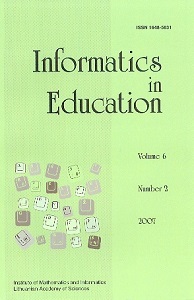To Schedule or Not to Schedule: The Effects of Course Structure on Programming MOOC Performance
To Schedule or Not to Schedule: The Effects of Course Structure on Programming MOOC Performance
Author(s): Erkki Kaila, Kjell LemströmSubject(s): Education, Higher Education , ICT Information and Communications Technologies, Sociology of Education
Published by: Vilniaus Universiteto Leidykla
Keywords: MOOC; shceduled vs. unscheduled; programming; student performance;
Summary/Abstract: Massive Open Online Courses (MOOCs) have become hugely popular recently. MOOCs can offer high-quality education for anyone interested and equalize the whole education field. Still, there are different methodologies for running MOOCs. Coming up with the most suitable methodology benefits both students and teachers. In this study, we have limited the methodological focus to observing scheduled and unscheduled instances of similar MOOC courses. While unscheduled MOOC courses can provide flexibility, they also require self-regulated learning strategies for students to succeed. To observe this, we compare the effectiveness of scheduled and unscheduled programming MOOC courses to find the most effective methodology. For this, we compare the pass rates and grade averages of five instances (two unscheduled and three scheduled) of Python and Java programming MOOCs. The results show that while the attendance numbers are higher in the unscheduled versions, in the scheduled instances the pass rate is significantly better, and students’ progression is much swifter. It also seems that the higher proportion of university students enrolled in a MOOC course positively affects the retention rate. Moreover, the students in the recent unscheduled Python version seem to score significantly higher grades than in its scheduled counterpart. Based on our experiments, the scheduled and unscheduled versions complement each other. Hence, we suggest that, whenever feasible, the maximal benefits would be gained if both types of MOOCs are run simultaneously.
Journal: Informatics in Education - An International Journal
- Issue Year: 22/2023
- Issue No: 4
- Page Range: 635-650
- Page Count: 16
- Language: English

